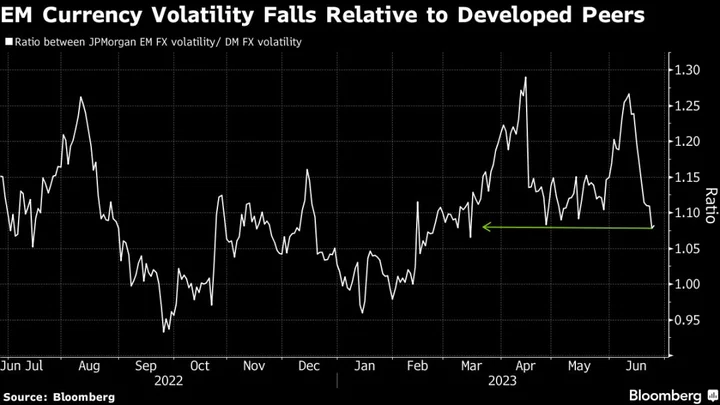With hopes for a monetary-policy pivot in the US and Europe dashed, money managers from Goldman Sachs to Citigroup are touting interest-rate cuts in emerging markets as a major investment theme for the second half of 2023.
Local-currency bonds in the developing world are already outperforming US Treasuries, with their average risk premium falling to a decade low. That’s prompted Goldman Sachs Group Inc. to advise its clients to lock in current yields in Indonesia, Israel and South Africa via interest-rate swaps, and Citigroup Inc. to recommend similar trades in India, South Korea and Brazil. HSBC Holdings Plc, on its part, favors long-duration bonds especially in Latin America.
The optimism follows growing evidence that emerging economies are stealing a march over richer nations in achieving peak inflation and terminal rates. The roster of developing countries pausing their interest-rate hikes is growing: Taiwan, India, Indonesia, Poland and Mexico. Hungary even cut rates and signaled further easing, while Brazil’s central bank has opened the possibility of a rate cut in August.
“Emerging-market central banks have got on top of rising inflation expectations a lot quicker than their developed-market peers and are now reaping the benefits,” said Paul Greer, a money manager at Fidelity International. “Until recently we had felt EM central banks might wait until the Federal Reserve gives the green light on easing monetary policy for them to start cutting. We now think this will happen regardless of Fed policy.”
What enables developing nations to move quickly on rate cuts is a combination of high nominal borrowing costs, falling inflation and low currency volatility. The Citi Emerging-Market inflation surprise index has fallen in 11 out of the 12 months to May, showing how price pressures have been undershooting estimates. Unlike the US or Europe, countries including Indonesia and Thailand have brought consumer-price growth within their target bands, while Brazil is on the verge of doing so.
“Many emerging markets were far more aggressive with policy rate hikes, never believed inflation was ‘transitory,’ and now provide investors with a substantial real-yield buffer,” said Aninda Mitra, Head of Asia Macro and Investment Strategy at BNY Mellon Investment Management.
Interest-rate swaps, which involve exchanging a floating rate for a fixed rate and vice versa, have become the first stop for money managers as they dip their toes back into the dovish-pivot theme after two years of hawkish moves across the world.
Goldman Sachs says investors must agree to receive fixed rates in rupiah, shekel and rand and pay floating rates on them over a five-year tenor. The so-called receiver trades should focus on two-year Korea rates on expectations the Bank of Korea will start easing cycle in October, Citigroup says. It also recommends a two-year receiver trade in India and Brazil swaps. Morgan Stanley favors Colombia and Brazil.
Some investors are taking the bond route, preferring to own long-duration securities that become attractive in a falling-rate scenario. HSBC recommends the debt of Brazil, Mexico, Indonesia, South Korea and Czech Republic as disinflation is gathering pace in these countries and will be reflected in yields. Greer of Fidelity said his top picks include Brazil, Mexico, Colombia and Peru as Latin America is at the forefront of this cycle.
A weaker trending US dollar as well as a plunge in currency volatility are emboldening investors to take bets on assets denominated in local currencies. An index of carry trades in eight emerging-market currencies handed investors a 5% return in the first half, the best since 2017.
However, gains were concentrated in Latin America, leaving investors betting on currencies such as South African rand or the Chinese yuan nursing losses. Strategists say bets in the second half on interest-rate cuts should also be similarly selective. Latin America and emerging Asia figure in most money managers’ favorites.
“Whereas policymakers in advanced economies have come under fire during this inflation shock, those in EMs have emerged with their credibility intact,” Neil Shearing, group chief economist at Capital Economics wrote in a note. “This will be remembered as the crisis where EM policymaking came of age.”
What to Watch
- China Caixin manufacturing PMI for June will be watched for clues on whether it will continue to remain an expansionary outlook or show a contraction
- Indonesia, South Korea, Philippines and Taiwan will be releasing June headline inflation figures, with price growth having decelerated in the previous month. Pakistan, Mexico, Chile, Turkey and Hungary will also be releasing inflation statistics
- Thailand’s parliament is set to convene July 3, the first time since elections on May 14, as lawmakers are expected to vote on a new prime minister in the days or weeks afterward
- Malaysia will be announcing its rate decision on Thursday after the policymaker surprised investors with a rate increase in May, with Sri Lanka and Poland decision makers to announce their rate decisions on the same day

